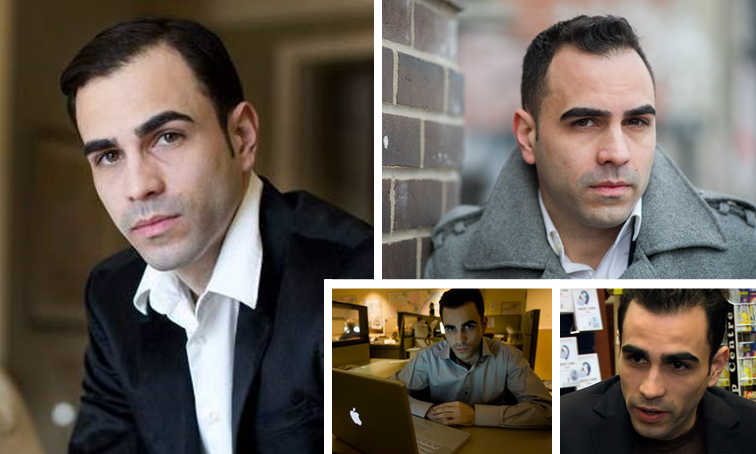
Oggi conosceremo un altro grande black hacker del passato. Parleremo di Michael Calce, noto ai più come Mafiaboy, uno degli hacker più famosi e ricercati al mondo. Si tratta di un hacker canadese, che ha effettuato numerose attività di hacking contro importanti multinazionali negli anni 2000 quando aveva l’età di 14 anni.
Michael Calce è nato nel 1984, nell’isola occidentale di Montreal, in Quebec. Quando aveva cinque anni, i suoi genitori si separarono e visse con sua madre dopo che lei aveva vinto una lunga battaglia per l’affidamento.
Ogni due fine settimana, Michael soggiornava nell’appartamento di suo padre a Montreal anche se si sentiva isolato dai suoi amici e dalla sua casa della mamma. Essendo così turbato dalla separazione dei suoi genitori, suo padre gli regalò il suo primo computer, all’età di sei anni.
“Ero un ragazzino piuttosto impertinente.” – disse Micheal – “Vengo da una famiglia divorziata. Mio padre aveva la custodia nei fine settimana e non sapeva come occuparmi, quindi prese un computer dal suo ufficio e lo portò a casa e mi disse: ora scopri cosa farne”
Questo regalo rese Michael immediatamente felice, infatti questa novità fece molta presa su di lui e disse:
“Ricordo di essermi seduto e di ascoltarlo emettere segnali acustici, gorgogliare e agitare mentre elaborava i comandi. Ricordo come lo schermo si illuminava davanti al mio viso. C’era qualcosa di inebriante nell’idea di scrivere sul computer, fino alla più piccola delle funzioni. Il computer dava a me, un bambino di sei anni, un senso di controllo e comando. Nient’altro nel mio mondo funzionava in quel modo”.
Fino a quel momento nessun problema, infatti Michael iniziò a conoscere la programmazione e l’interfaccia dei comandi, ma quando connesse il suo terminale ad internet, tutto improvvisamente cambiò.
Alcuni anni dopo, Micheal ottenne un abbonamento gratuito di prova ad AOL. Aveva 9 anni ed era la prima volta che si connetteva ad internet ed in pochi giorni, riuscì ad hackerare il sistema in modo da poter navigare oltre il periodo di prova dei 30 giorni.
Essendo quindi su internet, tra BBS e canali IRC, venne travolto dall’interesse per l’hacking e sempre più coinvolto in gruppi di hacker online di ogni tipo. Infatti disse:
“correla l’hacking con una droga. Proprio quel momento in cui si viola una rete e si dispone dell’accesso come amministratore, è inebriante. Per me, l’eccitazione mi ha spinto ad avere successo”.
Riportò anche anni più tardi che:
“l’intera comunità degli hacker era incentrata sulla notorietà e sull’esplorazione, mentre oggi guardi agli hacker criminali, e tutto ruota intorno alla monetizzazione”.
Il suo soprannome, appunto Mafiaboy, una sorta di “Pseudonimo” o “nickname”, se lo mise da solo intorno a 15 anni, a seguito di una serie di violazioni che effettuò di cui parleremo nel prossimo capitolo.
Il 7 febbraio 2000, quando aveva 16 anni, l’auto-acclamato MafiaBoy, preso di mira Yahoo! con un progetto che ha chiamato Rivolta. Rivolta consisteva in un attacco denial-of-service (DoS) in cui i server vengono sovraccaricati di richieste che ad un certo punto smettono di rispondere ai comandi. A quel tempo, Yahoo! era una società web multimilionaria e un motore di ricerca leader nel settore, ovviamente prima di Google. Mafiaboy attraverso Rivolta, riuscì baloccare Yahoo! per quasi un’ora.
Ma l’obiettivo di Michael non era il profitto, era solo una affermazione per lui e per il sui gruppo hacker nel cybermondo. Infatti Calce abbattè anche eBay, la CNN e Amazon, sempre tramite la tecnica del distributed denial of service (DDoS). Calce tentò anche di abbattere il sito della Dell, ma senza successo.
In un’intervista del 2011, Calce disse che questi attacchi erano stati lanciati involontariamente dopo aver inserito indirizzi noti in uno strumento di sicurezza che aveva scaricato da un repository sulla piattaforma di condivisione file, oggi inattiva, sviluppata dalla Hotline Communications.
Calce disse che si diresse a scuola, dimenticandosi dell’app che ha continuato ad attaccare i siti web per gran parte della giornata. Quando è tornato a casa, Calce dice di aver trovato il suo computer in crash, dopo un riavvio, non sapendo cosa fosse successo durante il giorno.
Disse che quando sentì la notizia ai telegiornali e ha ricostruito che quelle url erano quelle inserite nel programma, ha “cominciato a rendersi conto di cosa sarebbe potuto succedere”.
Si stima che il danno causato da questi down dei servizi abbia creato danni finanziari per 1,7 miliardi di dollari alle 16 società hackerate.
Per l’apparato di sicurezza nazionale degli Stati Uniti D’America, l’attacco di Michael è stato un campanello d’allarme. Il presidente Clinton ha convocato un gruppo di lavoro sulla sicurezza informatica. Il procuratore generale Janet Reno ha annunciato una caccia all’uomo, ovvero a Mafiaboy.
“Sai, sono una persona abbastanza calma, raccolta e simpatica, ma quando il presidente degli Stati Uniti e il procuratore generale ti chiamano praticamente e ti dicono ‘Ti troveremo’… a quel punto io era un po’ preoccupato”
Disse Calce e aveva ragione ad essere preoccupato. L’FBI era sulle sue tracce.
Calce racconta che l’FBI lo gli stava alle costole e aveva identificato dove viveva:
“Ho iniziato a notare questo furgone che era parcheggiato alla fine della mia strada, tipo domenica alle 4 del mattino. Era abbastanza ovvio che stavano sorvegliando la mia casa.”
Alla fine venne arrestato e il caso alla fine è stato processato in Canada, da dove proviene Calce. L’amministrazione Clinton ha inviato esperti di sicurezza informatica a testimoniare.
“E ‘stato un calvario piuttosto grande”, disse Calce. “Non importava davvero quello che dicevo a quel punto. Volevano solo fare di me un esempio”.
Venne infatti accusato di più di 50 crimini e alla fine è stato condannato a otto mesi in una casa famiglia.
Oggi, Michael Calce è quello che viene chiamato un white hat hacker. Le aziende lo assumono per aiutare a identificare i difetti di sicurezza nei loro sistemi e a progettare migliori funzionalità di sicurezza.
Dice che Internet è un posto molto più spaventoso oggi di quanto non fosse nel 2000. Per prima cosa, c’è sempre di più in gioco poiché ci affidiamo sempre di più ai sistemi online per la nostra vita quotidiana.
Guardando indietro, pensa che qualcosa di buono sia venuto dall’attacco che ha lanciato.
“Sollevai un sacco di problemi”, disse. “Sicuramente quello che riuscii a fare è portare all’attenzione la sicurezza informatica e i difetti intrinseci che derivano dai computer e da Internet”.
Ti è piaciuto questo articolo? Ne stiamo discutendo nella nostra Community su LinkedIn, Facebook e Instagram. Seguici anche su Google News, per ricevere aggiornamenti quotidiani sulla sicurezza informatica o Scrivici se desideri segnalarci notizie, approfondimenti o contributi da pubblicare.

 Cybercrime
CybercrimeLe autorità tedesche hanno recentemente lanciato un avviso riguardante una sofisticata campagna di phishing che prende di mira gli utenti di Signal in Germania e nel resto d’Europa. L’attacco si concentra su profili specifici, tra…
 Innovazione
InnovazioneL’evoluzione dell’Intelligenza Artificiale ha superato una nuova, inquietante frontiera. Se fino a ieri parlavamo di algoritmi confinati dietro uno schermo, oggi ci troviamo di fronte al concetto di “Meatspace Layer”: un’infrastruttura dove le macchine non…
 Cybercrime
CybercrimeNegli ultimi anni, la sicurezza delle reti ha affrontato minacce sempre più sofisticate, capaci di aggirare le difese tradizionali e di penetrare negli strati più profondi delle infrastrutture. Un’analisi recente ha portato alla luce uno…
 Vulnerabilità
VulnerabilitàNegli ultimi tempi, la piattaforma di automazione n8n sta affrontando una serie crescente di bug di sicurezza. n8n è una piattaforma di automazione che trasforma task complessi in operazioni semplici e veloci. Con pochi click…
 Innovazione
InnovazioneArticolo scritto con la collaborazione di Giovanni Pollola. Per anni, “IA a bordo dei satelliti” serviva soprattutto a “ripulire” i dati: meno rumore nelle immagini e nei dati acquisiti attraverso i vari payload multisensoriali, meno…